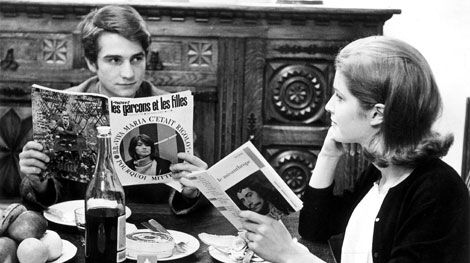Recently, I have been analyzing a lot of what exactly gave me the impetus, what exactly motivated me to write my story “I am Becoming a Woman”.
The novel “Christine” (1952) by English woman writer Pamela Hansford Johnson is one of those books that, since having been read by me many times in my youth, influenced some part of my life after that – for example, what I was like in my 17-18 years old. Thus, the reasoning and behavior of the Hansford Johnson’s heroine influenced indirectly the heroine of my own novel.
Now, when I decided to re-read this novel in order to find out how much echoes of this text can be found in my own story “I am Becoming a Woman”, I was surprised to see a fragment from the novel “Towards Swann” by Marcel Proust as an epigraph to “Christine”, including such words:
“all this was not only experienced, thought out, kept by me for a long time, but … it was my life and it was me myself.”
Yes, I was really surprised because it was Marcel Proust and his literary style who gave me the idea of writing my autobiographical novel, and thus both names – Marcel Proust and Pamela Hansford Johnson – turned out to be indirectly related and, so to speak, “the circle has beem closed” in a way.

As we recall, critics initially found the style of Proust’s first novel unusually confusing, especially when it comes to the chronology of the events he described. Life events, sometimes rather chaotical and unpredictable, emerged in the memory of the protagonist, serve in Proust’s book only as material on which endless analyzes of “elusive sensations” are built. In his text, Proust gives very little development of the plot in terms of the amount of “action”, but at the same time, a certain impressionable young man with a fine mental organization was chosen as the main character of the novel, who perceives these ordinary and unremarkable things that happens to him in a rather sharpened manner. Therefore, on the pages of the novel, we come across literally “kilograms” of the author’s reasoning on general themes and an analysis of the elusive feelings of this young man. And all this is held together solely based on the unique recognizable author’s style and on this very analysis of the smallest sensations, plus on not too banal – and sometimes, on the contrary, even on a little paradoxical – reasoning on general topics.
As for the literary cycle “The Unbearable Longing of the Flesh”, then as for events retelling, it is built much more linearly, although from time to time I am also quite a bit distracted from the main narration – well, I am doing this like in some play the actor sometimes utters next remark, addressing not to his partner, but turning conspiratorially to the theatrical auditorium.
In my immodest opinion :), the events of my youth were much more exciting than the measured life of the hero of Proust’s novel, and besides in my reasoning I stand on the position of a person familiar with the much later and more sophisticated fruits of intellectual achievements of human civilization than Marcel Proust used in his reasoning.
As for the novel “Christine”, this is a very interesting reading, first of all, for connoisseurs and lovers of the Clapham area and Clapham Common park in London – Pamela Hansford Johnson “dilutes” the diary of her main character Christine with numerous nature descriptions in these places at various times of the year… Besides this novel is interesting as a reflection of that distant era when pneumatic mail was used in London, and electric lighting was installed in houses for the firt time… The era of popularity of Hawaiian guitars, when young people first were eager to dance in clubs of London suburbs, and later were eager to drink cocktails in bars in Mayfair …
But, of course, the novel is interesting not only for researchers of the habits of Londoners in the early thirties.
Now, after many years, it was really touching for me to discover unexpectedly in the novel text those passages that I once carefully reread and which have become part of my personality. Of course, I have remembered for the rest of my life the final phrase of the novel “A stranger here, I was free,” it marked how the heroine is pleased to realize that she had long since escaped from the oppression of endless thoughts about her past.
The image of Christine in some way reminded me of the very image of a girl that looms in my own cycle “The Unbearable Longing of the Flesh.“ Most likely, I became just what I was because I repeatedly re-read the novel “Christine” in my adolescence.
So, Christine is looking for her love, not knowing yet what kind of the chosen one the fate will send her.
Of course, in your youth the idea of the future is imbued with an alluring foreboding of love, since all songs and books say love is something special, and the body is excited by the anticipation of something sweet and forbidden. Love longing is precisely what allows sometimes complete strangers to enter your life and sometimes even become a part of your life.
Pamela Hansford Johnson writes about the sexual side of Christine’s emotions with caution, noting that at that time (late twenties and early thirties) young people were still very innocent, and even in English there was no corresponding expression “to make love”. The author exquisitely compares the excitement of the heroine at the thought of sexual intimacy with “the fluttering of a flower in the close shackles of a bud,” and Christine, inspired by reading some love stories, imagines her wedding night in a dark room on the seashore, full of aromas flowers.
Of course, in my novel, I pay much more attention to the physical component of love than in this novel of the early 50s.:) My first book describes the habits of Russian youth in Moscow in 1987-1989.
The heroine of my novel, like Christine, is always very attentive to what exactly her boyfriend is telling her about his other women.
Following the young Christine, my heroine is sometimes vain and is fascinated by men’s age and status – indeed, what girl does not dream, for example, of an overseas prince who will take her away to the castle in his country? She is waiting with patience when, finally, cavaliers with their own cars will appear in her life.
The third part of the cycle, entitled “Flirting over a Cup of Coffee”, describes the love affairs of my heroine with mature, respectable men almost 30 years older than her.
Christine feels being in love and charmed by the male charisma of the boyfriend caring for her, despite her boredom already on the second date with him and realizing that the two of them will have nothing to talk about.
Later, Christine tries to convince herself that, probably, there is nothing special in the love and attitude of women towards her husband, and probably everyone has known this for a long time except her.
I will quote here the clever words spoken to the heroine of my story by one of her men about the selection of her future husband:
“Regarding vital precepts оf a wise knowledgeable man, addressed to a girl“ considering her future living ”, he advised me in any case to marry a man with a”lofty”education (he used not”high “but namely”lofty”as a joke), otherwise we would have nothing to talk about in the evenings of our future family life. “
Christine tries not to take to heart the fact that her chosen one is indifferent to literature close to her in spirit, and his ear pathologically does not distinguish melodies, although for Christine herself the power of music and memories of the melodies she has ever heard is of very great influence.
For comparison, I will give a quote about the meaning of music for my heroine:
“At that time – however, and now too – my ecstasy from music was so great that as the highest form of interaction with a guy I liked I was dreaming about joint listening to my favorite music.
This obsessive desire of mine is somewhat similar to the idea of the Marcel Proust hero, who was eager to admire the Gothic castles together with a beautiful girl, so that her presence would enhance his aesthetic pleasure of the beauties of ancient architecture. “
Inside Christine’s thinking there is some internal struggle all the time, and sometimes she even gets angry with herself because of feelings that go out of her mind control.
In building relationships, inexperienced Christine acts intuitively and sometimes makes mistakes, which brings her a lot of problems with her boyfriend.
Here’s what I write on this topic in my novel:
“When I still had no experience in dealing with men, then, finding myself in some situation together with them, I acted as some kind of instinct told me. And It seemed that this was exactly what the men expected from me.
Most likely, I behaved like this according to some woman in me who existed separately from me and who had lived much longer than me. Maybe she lived by some life of my dreams and wishes or continued her existence in the memory of previous generations – in a word, it was an “archetypal woman” in me. “



